#failure analysis
Text
i forget if i’ve posted about this before. stop me
blameless postmortem culture has a lot to offer, but other people explain that plenty. here’s the catch: it only works if these two conditions are met:
1. everyone involved is doing their earnest best (or at least, meeting the effort expectations agreed in the team)
2. everyone involved is working toward the same set of goals
if either of these conditions is not met, you have a problem. if the root cause boils down to “jimmy didn’t want to deal with it so he didn’t”, unfortunately that’s a people problem. you may be able to engineer it a little bit, but you can never really prevent it.
if the root cause is “someone or some team was working toward a different goal from the rest of us”, that’s either a communication problem (benign) or a people problem (malicious). in the benign case you can engineer better communication models and depend on people Doing Their Best to prevent the problem. in the malicious case, you can attempt to limit the impact of a trusted adversary…but generally at great cost to productivity, which really means the adversary wins anyways.
now that i’m looking at it, this really condenses down to just one idea, since you could say that doing your best toward a counterproductive goal on purpose is simply not doing your best in context. but yeah. if your RCA reaches “so and so chose to do y instead of x” and the next “why” comes up with “because they don’t care about the success of the project”, you really can’t engineer that away.
#ooh ooh i have an addendum to reblog!#rca#root cause analysis#blameless#blameless postmortem#failure analysis#these tags are so popular on tumblr. they are basically trending every week#program management
4 notes
·
View notes
Text
Failure analysis
Our Failure Analysis service for the electrical and manufacturing sectors offers a systematic approach to identifying the underlying reasons for failures. Rely on our expertise to provide you with actionable insights and strategies to enhance your equipment's longevity and efficiency.
Visit us at https://www.artemis-ts.com/solutions
0 notes
Text
The Failure You Know
Kinda like the devil you know only cuddlier.
As annoying and infuriating as government usually is, we have got to remember that government is just the people we elected or had our representatives hire to do ‘the People’s business’. Politics is messy because it only comes in Size People.
That’s true no matter what the form of government. Yes, really. If anything totalitarian governments spend…
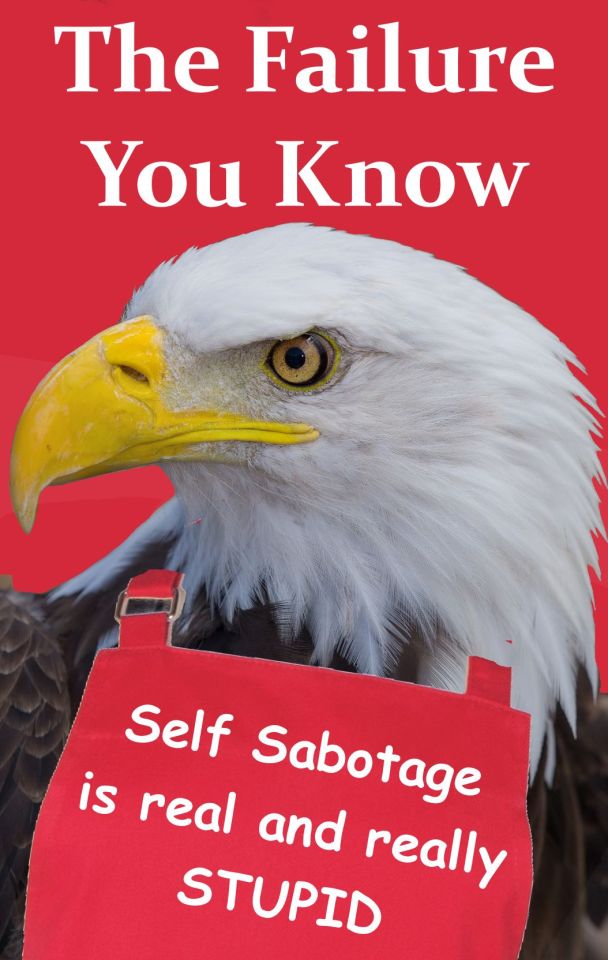
View On WordPress
#Change management#Cognitive biases#Critical thinking#Democracy#Empathy#Failure analysis#government#human nature#Political discourse#Social media addiction
0 notes
Text
Failure Analysis
Failure analysis determines what, why and how things went wrong when a component, system, or structure fails and is a valuable tool in the development of new products and the improvement of existing ones. Our multi-disciplined team has the expertise and in-house capabilities to determine the root cause of failures on a wide range […]
from NASA https://ift.tt/h8xiJfa
0 notes
Text
Best failure analysis Company
The benefits of failure analysis include Identifying molecular fingerprints of unknown compounds, Identifying weight loss at a different temperature, Strict Quality Practices
Measuring the melting point and crystallinity of a sample.
We give Morphology Analysis by using Scanning Electron Microscope (SEM). We use a high-resolution SEM with a large depth of field, which allows our scientists to record closely-spaced specimens at high magnification and sharp focus. At Bhawins you will get quality services for failure analysis. We have a look at our website https://bhawins.com/failure-analysis/
0 notes
Link

#Corrosion Testing#Corrosion Product Powder Testing lab#Chemical Analaysis#Failure Analysis#Raw Material Testing
0 notes
Text
in the nicest and most non-confrontational way possible. i feel like some of you think that anything that isn't directly openly spelled out for you within a story is "missed potential" or "unexplored." like. sometimes there are implied narratives. sometimes the point is that you as the reader are supposed to think and draw your own conclusions and participate in the story. the writers not directly spelling every little detail out for you doesn't mean that the story is poorly written or missed its own plot details somehow. PLEASE.
#if i get one more comment referring to zelda's draconification as wasted potential im going to lose it for real#that's not unexplored potential that is THE ENTIRE STORY. JUST BECAUSE THEY DONT BEAT YOU OVER THE HEAD WITH IT DOESNT MEAN ITS NOT THERE#i get this all the time with just like. link's trauma in general too.#like people will ask me 'do you think they should explore link's trauma more' and im like. they do#that's what the games are about. it's all there. they just don't directly state that that's what they're doing because theyre expecting you#as a reader to ENGAGE WITH THE DAMN TEXT BEYOND SURFACE LEVEL. UGHHHHHHH#WHATEVER. whatever#like i feel like some of you would read the great gatsby and be like#'there was a lot of missed potential to talk about the failure of the american dream' GIRL IT'S RIGHT THERE. JUST THINK A LITTLE#personal#and yeah obviously its not that deep its a video game but like. i am not making shit up when i write my comics and analysis.#I AM ENGAGING WITH THE TEXT. AS IS GENERALLY EXPECTED OF A READER#ugh ok whatever. im done now sorry
658 notes
·
View notes
Text
"I thought you might be lost." is one of the most delightfully romantic things Jon ever says to Martin.
It's so devoid of blame, of derision. A truly neutral statement, soft, no touch of sarcasm, no hint of cruelty. A gentle hand reached out to pull him from the depths of the lonely.
Such an unusual phrase for Jon, especially at that time. There's no definitives, it's entirely open to correction, open to being wrong. 'I thought' not I knew. It comes from Jon's perspective, he holds himself out to rejection, something that's hard to do at the best of times.
'you might be lost', not you were, not you are. He respects that this may well have been a conscious choice, that Martin really could have chosen to abandon him, preferring the lonely to the lack of certainty in their relationship. But it retains the softness and love, the worry and care. He was worried that Martin might not be able to find his way back, but not willing to drag him out of a place he might have chosen to be.
And that's not even mentioning the softness with which he says it. In an intense moment of great urgency and importance he's able to drop his fear, stress, and anger, in an attempt to reach the man he loves.
It's such an elegant moment of love; in a second Jon is willing to let go of the gravity of the situation and put all of his being into connecting with Martin, and when it comes down to it, it works.
#The magnus archives is a tragedy but how could a thing be painful if it doesn't first lull you with all you could ever want?#The amount of humiliation and failure Martin and Jon have to go through to make things work is far more romantic than love at first sight#Realism in communication doesn't kill romance it ENHANCES IT#tma#the magnus archives#the magnus institute#jonathan sims#martin blackwood#jonmartin#jmart#tma analysis#tma the lonely#tma season 4#tma spoilers
4K notes
·
View notes
Note
do you have any particular thoughts regarding marcille being a half-elf? its interesting to me considering the fact that she seems self-conscious about being a half-elf, but denies it when its brought up
i remember marcille looking visibly uncomfortable over laios simply asking her how old she is, which i think the only reason she might feel nervous about this is because it might reveal her as a half-elf to him.
she's never corrected anybody whose called her an elf either.
never mind the circumstances of the reveal, in which thistle goes on about how half-elves are inferior and accusing her of wanting to become full blooded elf, she seemed particularly upset like he struck a nerve-
i wish the half-elf thing was built upon more. also, underrated marcille line:
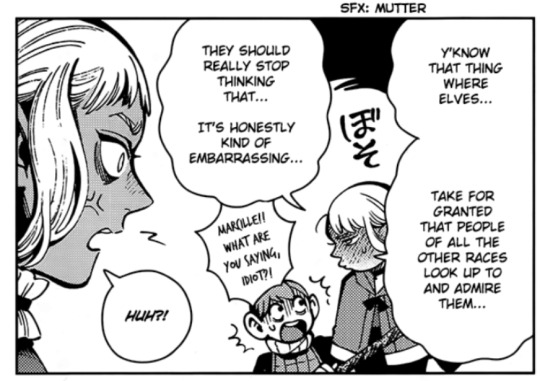
okay so i revisited this sequence just to make sure I could back myself up and it's just... man. there's a lot going on.
the first reaction we get from Marcille is this huge panel that takes up half of the page
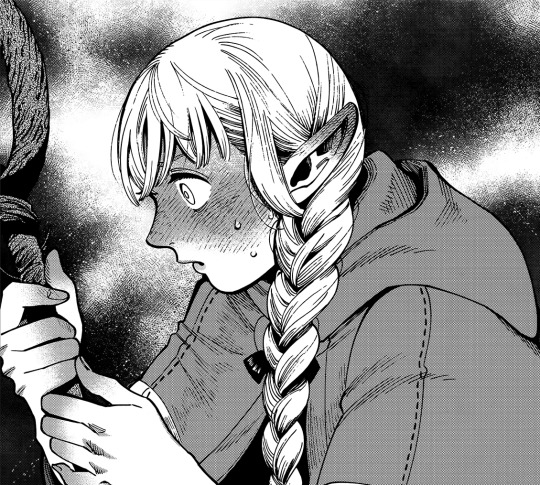
she is viscerally affected. flushing to the tips of her ears with the intensity of it. and we see it again, a few pages later
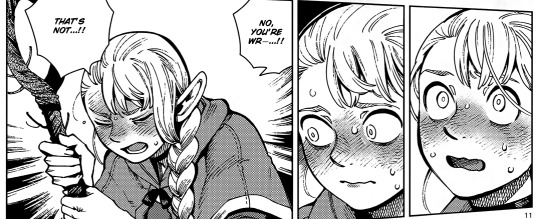
so it might seem like she's embarrassed about it and lying to herself, but... I really think it's just that Thistle is accidentally hitting sore spots. If you really look at what he says to get these reactions
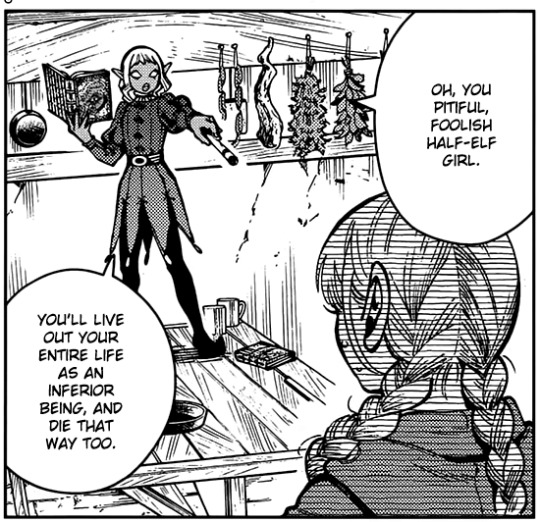
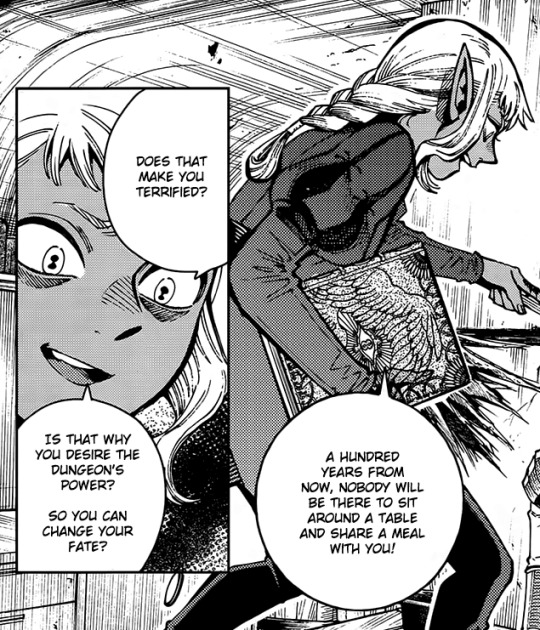
"you'll live out your entire life [...] and die that way too"
"a hundred years from now, nobody will be there"
Hear me out. I think, if he stuck to harping on about her inferiority without bringing up how terrifyingly long-lived she is, she wouldn't have been as bothered. But right now, Thistle is accidentally hitting all the marks on Marcille's deepest fears-- and this is after the Winged Lion promised her that her dreams could come true in an extremely vulnerable moment, so it also hits her slightly guilty conscience as well.
I do truly believe that Marcille isn't bothered about being a half-elf the way that people assume she'd be bothered by it. To her, the biggest problem with being a half-elf is that it's isolating.
On one hand, it's not hard to imagine why she'd distance herself from elves in the west. A lot of them can clock her as a half-elf on sight, unlike other races, and therefore she's always branded with this weird stigma of being Othered -- I would even say that she considers herself lucky for being born outside of elven culture instead of having to grow up in it. I mean, just... look at the way elves talk about her.
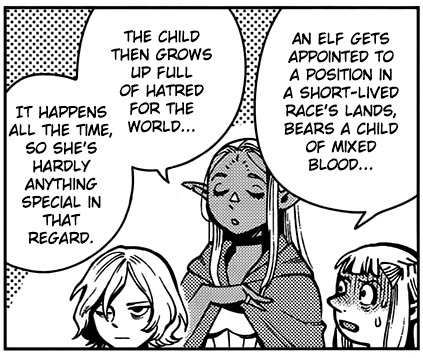

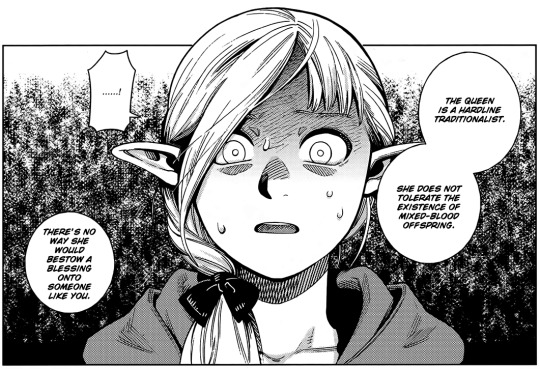
Skipping past the uncomfortable implication of what 'not tolerating the existence' of half-elves would actually entail, this is incredibly fucking annoying. You can see why she wouldn't want to be around elves much. You see a lot of Marcille reacting badly here, but honestly, almost all of it can be attributed to her freaking out that her bluff completely failed. She's honestly more paying attention to Izutsumi's footsteps and trying to coordinate an opportunity to escape.
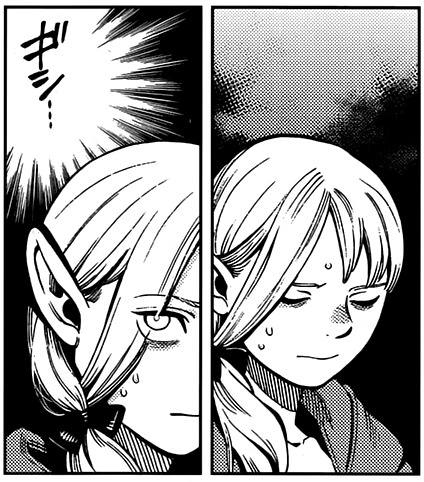
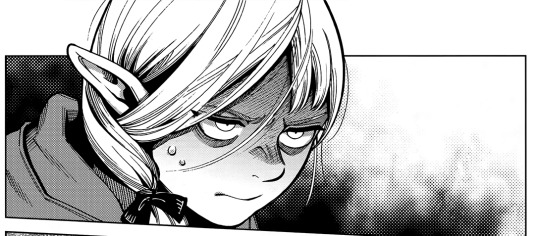
And in the end, you see her built-up frustration at being asked if she wants to be a full-blooded elf like 2-3 times in a row.
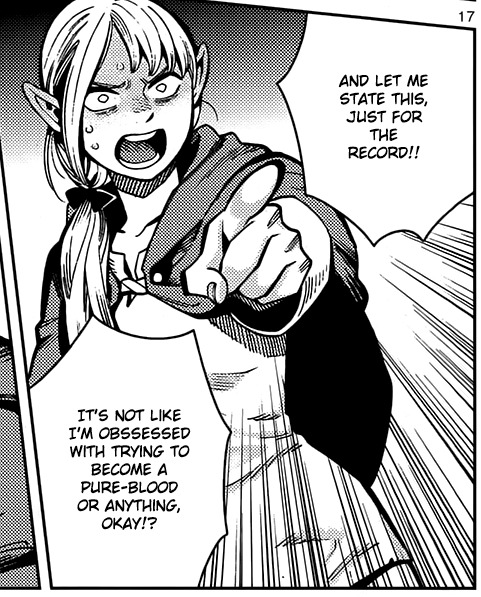
Yeah, yeah, "the lady doth protest too much," and all. But we know Marcille. We know that she's a lot more embarrassed and horrendously unconvincing when she's being prodded about something she's actually self-conscious about.
Moving onto the flipside of things, it might seem weird that she "pretends" to be a full elf around other races, but it's not really that strange if you think about it. Again, people are weird about her being infertile or whatever, and a lots of them don't even know much about what sets half-elves apart from everyone else. I mean, look at how uncomfortable Laios is just asking her about it
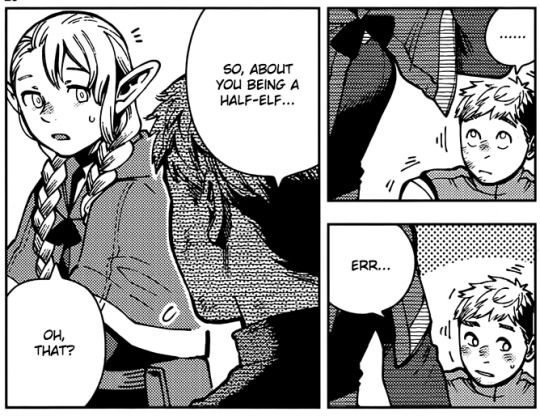
and look at how exasperated and resigned she looks
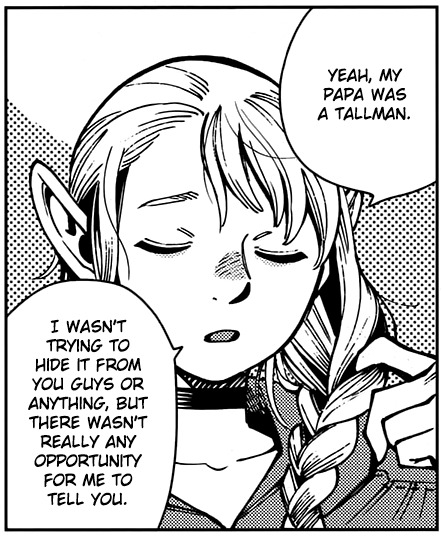
And like... she's right. Where would that come up in normal conversation? Why would she go out of her way to tell them? She's functionally a normal elf to other races anyway -- got the ears, the abnormally long "childhood", and the huge mana capacity. Unless it's directly relevant or important for people to know, I don't think it's all that strange or indicative of insecurity that she prefers not to bother with it.
(This combined with her sense of being an "outsider" to elf culture also explains why she thinks elf superiority is embarrassing. She sees the way elves treat short-lived races from the "outsider" perspective nonetheless, and thinks it's obnoxious; especially more so because she usually has to play the elf around short-lived races and deal with the reputation of arrogance that elves have built up.)
The sad thing is, this all means that... she doesn't actually fit in anywhere. She doesn't like going out West much because of how elves treat her. But she's also an outsider in the continents she was born in, treated like this exotic long-lived alien choosing to live among short-lived races for some reason. She is always an outsider, the Other, no matter where she goes. Add in the fact that she'll live longer than literally anyone she knows, and it's honestly kind of heartbreaking.
And I think that's the crux of it. Marcille really doesn't act like she's at all self-conscious about being a half-elf because of any feelings of inferiority or being half-made or whatever. She considers herself a perfectly legitimate being and might even, in some ways, consider herself superior to normal elves because she's not blind with elf supremacy or whatever. (And whatever "elven biases" she displays, all of them are born more out of the fact that she's kind of bad at conceptualizing how other races age and mature compared to herself, not that she actually considers herself better or more mature simply for being an elf.)
I think that whatever self-consciousness Marcille has about being a half-elf is, instead, related to terror and loneliness. The reminder that it ensures she'll never truly belong anywhere for the rest of her very long life. The reminder that, in truth, even she's not actually sure how old she is by other races' standards (hence the discomfort when asked how old she is). She doesn't want to not be a half elf, or be a full elf or full tall-man-- in her ideal world, she's still a half-elf. She just gets to live out her life at the same pace with the people she loves and doesn't have to say goodbye again and again and again until she dies.
and one last very important panel, right after Mithrun tells her that all her desires would be devoured
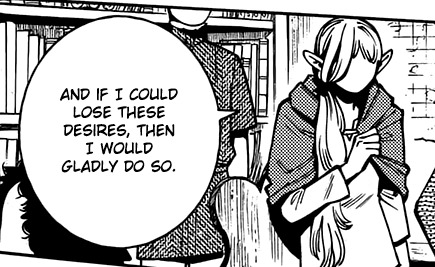
In her ideal world, she's still a half-elf and reality magically starts marching at her pace. But failing that, the second best thing is that she's still a half-elf-- but one who is able to accept reality and let go of her fear.
(But the rest of the story pans out the way it does because, to Marcille, taking reality apart and reshaping it was less scary than simply and fully reconciling with it.)
#asks#dungeon meshi manga spoilers#marcille donato#manga panel analysis#this is probably riddled with typos sorry#readmore cut bc it got long lmao#i ended up babbling about it bc it's such an important character detail to me#bc like... wow. she's so normal about it. she's literally just chilling.#the only thing that really bothers her is the material reality of it and how people treat her#the stereotypes the stigma etc. etc.#otherwise it just..#literally doesn't factor into her criteria for self-worth at all#the basic truth is that marcille likes herself on a fundamental level#she's not plagued by a deep and festering self-loathing the way a lot of characters in her archetype are#she likes herself and is proud of her successes and accomplishments#its just that shes terrified of failure and can have *episodes* of self-loathing when she fucks up#but who doesn't yknow#i know its a very slight nuance that makes very little difference in how her 'overachiever' problems manifest but its there#the sword of abandonment issues that hangs over her head has nothing to do with her self-worth or self-esteem or meeting her own standards#it has to do with the fear of not living up to *other* people's expectations and not being useful enough to be worth keeping around#she's good enough for herself but she's always so so so scared that she's not good enough for other people#i wont say much about what ryoko kui is saying using this as an allegory for real world racial biases but#dungeon meshi's treatment of marcille's relationship with her being half-elf is so incredibly important to me because it gets it so right.#a trauma about inferiority or being a half-being isn't inherent to the experience of being 'of two worlds' at all#that's something that's unfairly drilled into people by their environment#the *inherent* anguish is the loneliness. the constant longing. the fact that you are always homesick no matter where you are#always just a little bit of an outsider and never fully at home#and dungeon meshi gets that.#edit: cleaned it up a little
117 notes
·
View notes
Text
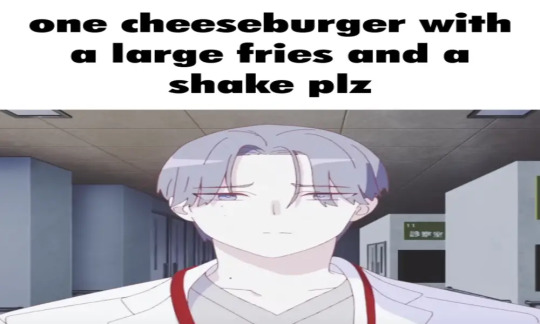
As an honorary Shidou apologist, I am breaking my silence. I’ve finally decided to go on a rant on why I don't think Kirisaki Shidou is an organ harvester.
(fair warning I like absolutely suck ass at organizing my thoughts, so if some of this is incoherent or if it seems like i'm repeating myself my bad 😭 I mainly wrote this for fun)
So, I'm aware that this theory is the most popular consensus when it comes to Shidou (and tbh, I think part of it is because a lot of people kinda look over him? Like at least a tiny bit more than the others, considering a lot of people also don’t realize how his main victim was probably his son and not his wife, but I digress) (plus I think all milgram characters are looked over to a certain extent). While I do think parts of it are probably accurate in some way, I don't think he was a full-on organ harvester (as in he actively stole from patients through illegal means. emphasis on actively) and that the theory in and of itself is flimsy at best. He's morally questionable, yes, but it’s more in the sense that he’s a somewhat apathetic guy who lacked understanding on how his own set of morals and values (i.e. pushing for organ donation) could be seen as wrong. So if he were an organ harvester, wouldn’t he be aware that it’s illegal? That’s what confuses me whenever people bring it up. I don't actually doubt that he may have done something illegal for his family's sake, it’s just that I still highly doubt it was something he actively did. And that seems to be what a lot of people think when they refer to the theory. (if i’m wrong please forgive me, i just assume organ harvester shidou = people think he did it as a job)
Anyways, more under the cut for those interested (it's a bit lengthy my apologies)
It then kinda trickles down to how his guilt stems more from the consequences of his actions rather than the actual action of taking organs. The root of his guilt comes from the realization that basically asking families to pull the plug and use their loved ones' organs for donation is a very, very hard decision; one that he kept pressuring for. If he was an illegal organ harvester, and was aware that his actions were in fact illegal, why the hell would he feel so guilty to the point that he’d start having suicidal ideations? That’s the key difference between his profession and his possible criminal activities; one is a burden both emotionally and morally, the other is more or less a literal burden. And based off of Shidou's character, he seems to be much more emotionally affected. That's also why I think a lot of people jump to the conclusion that his guilt stems from his actual actions rather than their effects. (does that make sense oh lord i am going ☝️🤓 so hard rn)
I get that some parts of his MV or lyrics seem to be suggesting that, but also it’s important to note that Shidou has a very strong bias against himself and definitely painted himself in a negative light. I mean, that's why he thinks every single preceding patient before the final incident is a victim to him, why he shows himself staying professional in a professional setting as apathetic (minus the pressuring part), and why he literally equates his job to STEALING. Not only that but, imo, it's also a little too unrealistic and might not actually fit the criteria of Milgram. Milgram is for crimes that are in a morally grey area. So if it really was organ harvesting, is it really in a grey area? (though I guess you could say that doing it for family's sake would be, but that's only for his family. He'd have no reason to do it otherwise). Plus, it'd make more sense and fit the theme of touching upon social issues (i.e. abortion, bullying, societal standards, mental health, etc.) if shidou’s entire dilemma was in regards to (albeit questionably done) organ donation, a complicated ethical topic in Japan.
Throw Down actually gives a pretty good rough idea of Shidou's thoughts towards his crime and his feelings in regards to it. He felt like he was blinded by his own values, and that inadvertently caused him to be unaware of the suffering he caused through his job. It really does shock me that he somehow was able to pull-off getting a forgiven verdict in T1 because he certainly comes off as cold and uncaring in regards to his work.
I think the final bridge in Throw Down kinda summarizes his entire mindset, actually.
Now slowly close your eye, put your regret on display
Wishing you for someone else's sake
With the same expression no matter who comes
I don’t feel scared because I don’t know
Shidou doesn't quite understand the feelings of his patient's families, and therefore he acts remorseful and sympathetic more than he actually feels. Why? Well, because he didn't know. Up until that point, he never understood the weight of his actions, and focused on his role as a doctor. "This is an upsetting subject, yes, but it's for the greater good, right?” A braindead person has little to no chances of living, so why not use this as an opportunity to donate their organs? Moreover, as a doctor I believe it’s typical to be "emotionally detached” (for lack of a better word) since I’d assume becoming emotionally connected with a patient would make things at least a bit messy.
His mindset comes crumbling down though, presumably because he experienced the same or a similar situation. This part remains muddy for me, since we don't know much about what the actual cause for Shidou's guilt is. There are several possibilities, with the most plausible ones being:
he lost his own family member and had to go through with the same decision,
he tried to save a family member using donated organs, but failed, making it seem like everything he has done as a doctor was in vain
(a secret third option would be him making someone he cares about make that decision but it's very unlikely and also requires too much mental gymnastics)
But no matter what exactly he did, it all trickles down to the validity of his morals. After realizing the pain of losing a loved one, the struggle of trying to save them, and the unfortunate failure which left all efforts practically pointless, Shidou would understand the actual weight of his actions and why all those families were so reluctant to let go of their own.
This is even more evident in his T2 voice drama, Asclepius.
"In order to save the life of someone you don't know, please let me kill your family," I told them. It doesn't even take much thinking to realize how cruel that is, but… I didn't realize it until the very end.
This is the gist of Shidou's crime, or at least part of it (considering he says "Well, about halfway" when Es asks if their judgment was right). Again, this tells us that Shidou's guilt comes from the act of the effects of organ donation rather than the literal action. And this also implies that his "murders" did in fact have to do with being in a medical situation, it's just the way he went about it was at the very least morally questionable.
I will also acknowledge that he says he killed for selfish reasons, which most likely relates to trying to save his own family member. Here he could possibly have actually done something illegal such as tampering with patients or illegally taking their organs (latter is a stretch imo). Plus, his distorted T2 voice trailer line is literally "You're in the way, hurry up and die" which would only make sense in the context of waiting for a patient to die. But it could also just be him continuing to pressure for organ donation, but now with his own selfish motives.
Going back to the "halfway" comment, while I personally believe it might have to do with how Shidou views his crime as more than just taking organs, it more likely implies that something else happened that Shidou would consider murder. That being the actual death of his family member. It's implied through Throw Down that he was trying to save someone but failed, which he was responsible for. Then from there it'd make sense to assume that he would feel some form of guilt for the rest of his patients, either for the reason of failing to actually utilize donated organs even with the opportunity of being able to save them, or for just realizing the what it actually feels like to have to give up on your loved one. (does. does that make any sense.)
So yeah, I don’t think he’s an organ harvester due to what’s known regarding his crime, the reasoning for his guilt, and with the way he is as a character. The most I’d personally believe is that he decided to harvest organs for the sake of his loved one, but even that seems like a stretch to me. Thus, that is why I believe Kirisaki Shidou is not an organ harvester.
Anyways I’ve rambled on long enough, thank you for reading if you did and remember to drink water and vote shidou innocent in trial 3 because i will shit my pants if he doesn't get inno
#milgram#shidou kirisaki#kirisaki shidou#milgram analysis#everyone point and laugh at me for writing so much#i am so terrified i said something wrong like if i did then strike me dead#kirisaki shidou DESTROYED MY LIFE#i love the pathetic failure doctor#i swear on my life he'll get 3 innos no matter what#shidou i am begging you do not pull out some bs that'll make you seem less favorable than you already are#chibi's ramblings
89 notes
·
View notes
Text
Texts in Like Minds: Sally's Books

After her first encounter with Alex, Sally returns home and consults a stack of books while listening to the recording of their discussion. Of this stack, only two titles are discernible. The first book is shown briefly and set aside, and the second is opened to a bookmarked page. This large tome is titled Principles of Criminal Psychology (Fifth Edition), by George R. Booth and Andrew Porter. Sadly, I cannot find even the tiniest scrap of the existence of this book online. It is clearly a textbook, and presumably one she would have kept from her school days given that it’s directly relevant to her career. The bookmarked page is titled “Chapter 27: Gestalt Theory”, and the opposite page features photos of Leopold and Loeb, who I have discussed elsewhere. The text itself is unfortunately not clear enough to be readable.


Returning to the first book we see, there is much more information to be found online. It is titled Gestalt Therapy: The Attitude and Practice of an Atheoretical Experientialism by Claudio Naranjo, first published in 1993.

The recording Sally plays during this moment is their exchange regarding gestalt. This concept is one that the movie highlights in this scene and again at the end during Sally’s address to her peers, but it does not clearly define or explain the idea of “gestalt” for the audience. Gestalt first arose as a philosophical principle suggesting that the experience of the parts of something cannot fully represent the whole of that thing, like the notes of the song versus the experience of the song itself. A cursory search of various articles online can give a brief overview of the core ideas of gestalt psychology. Wikipedia says this:
Gestalt psychologists believed that breaking psychological phenomena down into smaller parts would not lead to understanding psychology. Instead, they viewed psychological phenomena as organized, structured wholes. They argued that the psychological "whole" has priority and that the "parts" are defined by the structure of the whole, rather than the other way round. Gestalt theories of perception are based on human nature being inclined to understand objects as an entire structure rather than the sum of its parts.
This gives us a more thorough explanation of Alex’s very brief description of “gestalt”, but does not provide much insight into the meaning of his hints to Sally or why gestalt would have any bearing on his relationship with Nigel. The implication we are left to surmise is that these two separate boys have combined as individuals to create a whole greater than the sum of its parts, and Sally lampshades this idea at the end in her speech referencing the movie title. However, examination of these two books has given me some new thoughts about the use of gestalt in the film and about Sally’s conclusion regarding the dynamic between them.

Alex’s next words to Sally feel extremely significant and should be considered thoroughly: “It’s not what it is. It’s how you use it.” Given that both these books reference “gestalt therapy” specifically, it’s worth looking beyond the core theory of gestalt psychology to see how therapists actually use these ideas in practice. I found a clear explanation on this page:
Gestalt therapy is an existential and experiential psychotherapy that focuses on the individual's experience in the present moment, the therapist-client relationship, the environmental and social contexts in which these things take place, and the self-regulating adjustments people make as a result of the overall situation. It emphasizes personal responsibility. Gestalt therapy was co-founded by Fritz Perls, Laura Perls and Paul Goodman in the 1940s–1950s.
Gestalt therapy is built around two central ideas: that the most helpful focus of psychology is the experiential present moment and that everyone is caught in webs of relationships; thus, it is only possible to know ourselves against the background of our relation to other things.
I think we can already see some connections with the story as Alex presents it. Alex and Nigel are inextricably entwined in a web of relationship, and we the audience find it impossible to understand either character outside of this context.
Here I would like to suggest some Doylian interpretation which I believe to be possible or even likely, but for which I can offer no concrete evidence. We know that Greg Read initially intended to make a documentary about the phenomenon of two people who match each other’s freak so well that they enable a worsening of sociopathic tendencies to the level of violent criminal behavior. In one interview, he referenced a paper he read about gestalt psychology which opened doors in his mind and led him down this path. He had developed the documentary idea enough to show it to other people, and someone told him it would make a great fictional movie. Based on this, I assume he must have acquired additional materials beyond that first paper, conducting extensive research on the idea in preparation for the documentary. I posit that the books Sally uses in this scene are Greg’s books, or copies of the same books he had referenced. All of Sally’s scenes were filmed in Australia, so it’s not outside the realm of possibility that he simply brought (or already had) his own books on set.
Working from that assumption, the ideas found in Gestalt Therapy: The Attitude and Practice of an Atheoretical Experientialism might be taken as extremely influential on Greg’s thought process in writing this film. While the whole text is not available online, there are a few excerpts one can read for free here. (The book itself is available through multiple websites for around US$40 at the time of this post.) If we examine the excerpts below within the context of the movie, a few things really stand out (emphasis mine):
Perls sometimes stated the principle entailed in such strategy as one of absolute validity: You never overcome anything by resisting it. You only can overcome anything by going deeper into it. If you are spiteful, be more spiteful. If you are performing, increase the performance. Whatever it is, if you go deeply enough into it, then it will disappear; it will be assimilated. Any resistance is not good. You have to go full into it—swing with it. Swing with your pain, your restlessness, whatever is there. Use your spite. Use your environment. Use all that you fight and disown.
This sounds remarkably like the process Alex goes through with Nigel, resistant at first and gradually leaning into the swing, learning to embrace and roll with all the things he was fighting against. A case might also be made that Nigel partakes in this process as well: he too is resistant to Alex initially, but the train scene marks a turning point in which he seems to make the decision to lean into the violence that Alex offers.

Returning to Alex’s assertion that it’s not about what gestalt is, but how you use it, these passages take on a whole new meaning. Sally’s speech at the end of the movie suggests that she arrived at the conclusion, based on her belief in Alex’s version of events, that Nigel essentially used the techniques of gestalt therapy in a twisted, malicious way to manipulate Alex towards the culmination of the film. As she says,
“What follows, through a system of either intimidation, manipulation, or coercion, is the dominant individual begins to focus and influence the thoughts of the subordinate partner. This process nurtures a subjective gestalt where similar thoughts, fantasies, and other interlocking elements conspire to form a greater and more volatile whole, therefore, a merging of like minds.”
Now read the excerpt below in light of these descriptions:
In the strategy which pervades Gestalt practice, the therapist is leading the patient through a process similar to that through which a child that is learning to sit on a chair needs to discover that he can sit only by giving his back to the chair, not by moving towards it. While this is a discovery that many make at a certain point in a typical session, a spectator may not share the insight. The patient discovers that his resentment was a diluted and devious form of healthy aggression, for instance, but this spectator may be frightened by what he sees as destructive loss of control; what the patient experiences as a rewarding and cleansing explosion of grief, brought about by the exaggeration of emptiness, the observer without familiarity with Gestalt may fear that the therapist, by urging on the patient’s symptoms, may lead him to suicide. The therapist’s ability to bring a patient to the turning point where his disowned destructive energies become his own purified strength will depend, in large measure, not upon technique alone, but on his experiential knowledge that this is possible, and in the consequent sense of trust in the constructive drives of which pathological manifestations are a distortion brought about by unhealthy denial and which can heal by itself in the presence of awareness. Such trust will enable him to pursue a given course of action to an effective degree, in spite of the patient’s chaos, rage, or loss of control—and will be important, too, in eliciting the necessary trust in the patient for him to let go.
Gestalt therapy is based on the principle that to alleviate unresolved negative feelings like anger, pain, anxiety, and resentment, those emotions cannot just be discussed, but must be actively expressed in the present. Without that, psychological and physical symptoms can arise.
These passages represent the intended healthy expression of these principles. If we take these ideas and techniques and twist them into an unhealthy, intentionally manipulative and toxic dynamic, it maps quite clearly onto the relationship between Alex and Nigel and the actions they take throughout the film. Sally assumes that Nigel is in the role of the “therapist” leading Alex the patient through this process. The movie’s ending presents itself as a twist and suggests that these roles were in fact reversed, particularly in light of Alex’s first interview with Sally and his ominous and vague statements about Nigel's death being a necessary means to an end. If we accept that conclusion at face value, then consider how Alex “urging on the patient’s symptoms” may have actually “led him to suicide”.
The Gestalt therapist contrives experiments that lead the client to greater awareness and fuller experience of his/her possibilities. Experiments can be focused on undoing projections or retroflections. They can work to help the client with closure of unfinished Gestalts ("unfinished business" such as unexpressed emotions towards somebody in the client's life).
What is the climax of this movie if not Nigel creating a violent type of closure with his unexpressed emotions toward his parents? “It’s how you use it.” Did Alex use gestalt therapy techniques to draw Nigel into this violent chain of events as “a means to an end”? If so, what actually was the “end” he desired?

Incorporating this information into our interpretations of the movie still does not necessarily force us into accepting Alex as Mastermind as the only reading. I think you can certainly see that dynamic, but it doesn’t preclude Nigel as Mastermind. In my further reading regarding gestalt therapy, I found this passage in a blog post:
A thirst for experience is part of all life. Often though, this takes the form of a wanting to move on and on to other experiences than those at hand. A craving for more replaces the need for depth that could be our natural mode of contacting the world, had we not become desensitized to it. Intuitively seeking that depth or fullness of awareness that is on our birthright, and not finding it, we seek the substitute of environmental stimulation: spicy foods, rock climbing, high-speed sportscars, competitive games, tragedies on the movie screen.
This describes Alex perfectly and speaks to his own need for the gestalt therapeutic approach. We could argue that Nigel addresses this drive for more experiences by bringing Alex into a focus on the depths of the present moment, existing in the now that Nigel creates for him as he attempts to understand his own feelings and reactions. As the book puts it:
The Perlses believed that it is not our responsibility to live up to others' expectations, nor should we expect others to live up to ours. In building self-awareness, gestalt therapy aims to help clients better understand themselves and how the choices they make affect their health and their relationships.
My own interpretation is one of equal partners both playing the role of therapist and patient to each other. Gestalt therapy relies on the ability of the therapist to set aside their own interpretations of the patient's experiences in favor of allowing or guiding the patient to arrive at their own understandings and conclusions. I do not think that sole responsibility can be placed on either Nigel or Alex, and the events of the movie could not or would not have transpired without the active participation of both boys in each other's lives. While the context is a dark expression of these ideas, both Alex and Nigel help each other build self-awareness and achieve a better understanding of themselves.

Like Minds Masterpost
#i just had to put that shot of Sally at the end because she's so absolutely gutted at her own failure - i'm so mean#greg really did say what if two guys matched each other's freak#like minds#nigel colbie#alex forbes#nigel colbie x alex forbes#tom sturridge#eddie redmayne#murderous intent#like minds 2006#like minds analysis#murder boyfriends
29 notes
·
View notes
Text
love thinking of sad traumatized edgy characters in normal situations but not in a ‘how do you think X event affected the way they handle everyday life’ kinda way but in a ‘what do you think 358/2 days rikus hair care routine is like’ kinda way
#Kingdom hearts#Riku#kh riku#Idk#Either he’s a ‘mens-13-in-ones’ kinda guy or a ‘uses physical self care as a way to distract from horrific mental self care’ kinda guy#My biggest character flaw is my failure to look at sad fictional characters and concepts if there’s a funny thing I could think about/j#Guy who wrote a whole essay analyzing riku in my tags I get it and I agree completely I love riku analysis I love his complexities#I love his depiction in 358/2 it’s my favorite version of him but also I’m a funny little guy and I’m just crackin jokes around here#Unstoppable force (enjoying legitmate character discussion and analysis) vs immovable object (I just thought of a joke)
362 notes
·
View notes
Note
I also wasn’t a fan of ness backstory but would love to hear your personal opinions on why you didn’t like it as much?
I HAVE SO FUCKING MUCH TO SAY-
T/w for excessive amount of hate and oversharing lmao
Well, in the beginning I'd like to say that I grown up in some shitty circumstances which resulted in me having some, uhhh, Ness-classical problems so I may be biased here 😭 Rather not "may" but "will". How can I continue to relate to him when he's like that. Like that's not a representation I wanted. Where's emotional deprivation? Where's emotional abuse? Where's his unsuccessful attempts to get his parents and siblings love because no, lol, no 7 yo child will just accept that he's outcast and be ok with that. He should have tried to adjust to them, he should have tried to reach them, satisfy, do at least something for them to care about him BECAUSE THAT'S HOW CHILD PSYCHE WORKS. And where else would he get this people pleasing towards Kaiser if not from the family? Kids need love for survival, it's not optional. It's a need. They can't just say "oh yes my parents and siblings are stupid I'm going to be alone from now on!".
Okay, now in the order.
First of all, we get the scene of Ness mother saying him he should cure his finger himself, even comforting him while saying that with her "chance of you dying from it is incredibly low". Bad words, bad phrasing, bad everything, it's like to say "dentist just gonna use this drill to take your rotting teeth off" to a kid but still - it's not direct scolding or hate. It's bad, but care. And like, yes?? It was quite a normal parental behavior, even if not really sensitive? You can't be near your kid all the time, they should know how to help themselves because one day you WON'T be there for them. It's a normal way of raising a kid if you don't want for him to grow up weak-willed and helpless. Bad way to approach that, but still. She even mentions that he shouldn't bother her with every LITTLE cut - she'd care for him instantly with something serious. Since we get this flashback from Ness from his following age, we can conclude that he still cherishes that memory as something which hurt him deeply and which was incredibly cruel from his mother to say, forming his personality. And that's… At least strange.
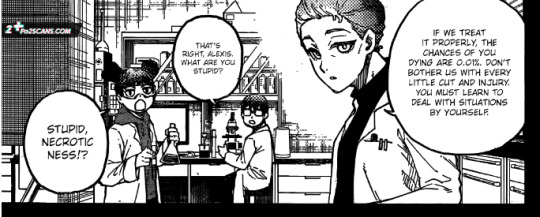
I mean, I also have a story when I cut my finger really deep as a 5 yo and my dad said smth like "go and spit on it and don't bother me" but I won't say it was turning point in our relationship lol But it was valuable in addition to all of other fucked up shit. Otherwise I wouldn't have remembered it at all.
I'm not saying that my experience is the only relevant but child's psyche, especially with some predisposing towards anxiety and personality disorders, has basically the same algorithms. Because till the transitional age child is like a clay, not having it's own form yet. He just adjusts to his family and surroundings.
Memories like that are the ones which CAN be turning points but ONLY in addition to other. They can't be, like. Definition of how your relationship were. It's one small insignificant episode.
Reaching the next scene - Ness reading his book and asking his brother and sister AGAIN about some magical something. Do I need to say that any kid would be irritated if their younger sibling will go and whine around about something you don't like, and again again and again when you have not once said that "that's nonsense I don't like"? It's a normal reaction for kids. They're not grown adults to control their each and every action understanding Ness fragile psychology.

Also, I mean- he got that fantasy book from somewhere, right? He is little kid ~6 or 7 yo, I believe there's few ways for kid to get one. Even if it was gifted by his grandparents or family's friends, or taken from the school library, it's not that his parents have teared the pages from this book. He reads it quite calmly, not hiding - and even demonstrates it to his siblings. His parents allowed him to read such books. No one was REALLY against him reading about something he liked. Not understanding, yes, being bad emotionally repressed family, yes, offending him in some way, probably not really caring, but… It's not that bad as Ness tries to show, at least from the side of his mother and siblings.
Secondly - snowman 💀. Lol, Ness, sorry but have you heard about Rin + Sae drama? About Barou and his little sisters because of which he probably has this obsessive compulsive thing with cleanliness? I love my little brother deeply, but for god's sake he was awful as a kid, the type that will put the hand in the fire and in socket just because I said "you can't do it it's dangerous". Even if we really got along despite the different attitude towards us from our parents, we still fought, and screamed, and got scandals over the laptop. It's a normal part of growing up with siblings.
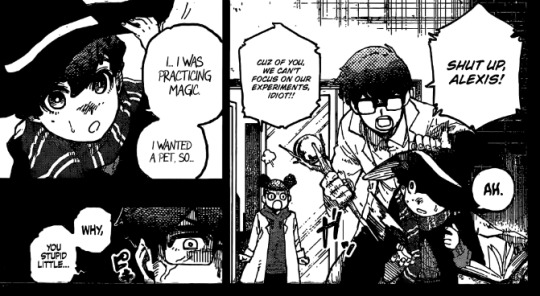
Not just normal, but obligatory.
And… Ness' brother and sister actually tried to get along with him till some point, even if in their own way. They tried to make him fit into their world because somehow, but they loved him, and wanted him to be more or less happy and near them. They couldn't understand his passion for magic, they couldn't realize - but they had their parents as example, and they knew that while two of them fit into their parents world, Ness doesn't. And thus both magic book scenes and snowman one were a normal reaction from young kids - Ness irritated them, being too loud, and speaking some nonsense because of which they couldn't play and research together, all three of them. That wouldn't be a normal reaction from grown ups, but once again - they're kids. Siblings. Destined to ruin each other's things lol
Thirdly - no one with dirty hands should enter the house, go and wash them. ????? How is that even??? Maybe they'll also ask him to take his shoes off in the wardrobe? The cruelty of parents.
His mother even explains him why he should wash the hands before coming in. Like- I don't want to dig into psychology of two-frames character, but she looks incredibly emotionless and deathly tired. She has three kids and work at home for god's sake. And she STILL finds time to explain Ness how sounds and snow works, probably trying to comfort him somehow. She loves him, just as she loves her other kids - she tries to comfort him in her own way.

Should she have had three children if she didn't feel the need to take care of their every issue, including emotional? No. Does she cut down her children and husband when they offend Ness? Also no. Is it possible to understand her? Absolutely yes.
Through his dad indeed is a jerk lol but I feel that he's not really present in the family? It's usually her and Ness and his siblings. Imagine having a full ass house, in which she works full-time, three 5-9 yo one of whom is constantly injuring himself, and with two others probably fucking up their experiments and her work as well without her husband around. Like…
And the fact that Ness doesn't analyze anything at all, placing himself in a victim position not trying to understand that world doesn't revolve around him and other people don't understand him by default and act the way they think is right and good for him, is, uhhh. Note that "understand" doesn't mean "forgive". It's just about a critical view to the world.
Aaand regarding the kainess flashbacks… I can't say anything because it was just bland and stupid.
Overall I got a feeling that this was just lazy writing with cute kids fanservice so we'd be more invested in the last game with PXG. I mean, those scenes with milk, shower and oversleeping? I can imagine there any other pairing in blue lock - nagireo, bachisagi, kunigiri, etc etc etc. There's nothing special, nothing unique for us to actual feel something towards kainess. It's just a template into which familiar faces have been substituted - and totally OOC.
No toxic dynamic, especially the codependent one kainess have, works like THAT at the start. Even at the sugary period when one non-self-aware manipulator instinctively tries to bend other to himself being nice and everything. Ness behavior towards Kaiser also makes no sense - those things are ALWAYS growing from experience. From the need to please your parents, to try to track your every word, walking on a thin ice.
But Ness never shown such things in his flashbacks, never taking back from telling each and everyone about magic and him being a football player. Then where did this attitude got from? Just from loneliness? It still doesn't work like that THIS HIGH like to the level of enduring physical pain and alcohol in the face.
I low-key hope that Ness is unreliable narrator, so we actually DO NOT see the way his real relationship with Kaiser were at this time. We see only memories and impressions, and his memory saving only good from them - thus it may (PLEASE) happen that from Kaiser's POV it will be totally different.
The last thing about kainess I SOMEHOW liked (because I'm sure it wasn't intentional writing from Kaneshiro) is the way Ness reacts to Kaiser choking. Because he pays no reaction to it - and no real friend/lover would react like that for the sight of your dear person suffering. He doesn't care about Kaiser as of Kaiser - the thing I suspected from the beginning but didn't really liked because that's so predictable and dull. He doesn't even know about Kaiser's habit of choking himself. He doesn't really worry about Kaiser - he worries only about his idol, which he doesn't see a human behind. This was a fun thing to think about prior to this chapter because of the potential of angst from Kaiser's side who'd feel how this "love" is synthetic to the core, but I'm not sure I'd love to see this in the manga. But at least this would be yes, realistic, logical and painful, especially in that "Yoichi's magic" and naked king theme.
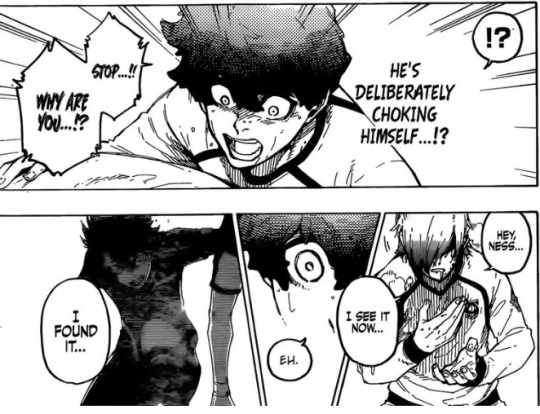

The only thing I really 100% liked without any whining from my side was that "undescribable feelings/undescribable sadness" frame because lmao 🤝🤝🤝 At least here you get it Ness. This frame is engraved in my memory.
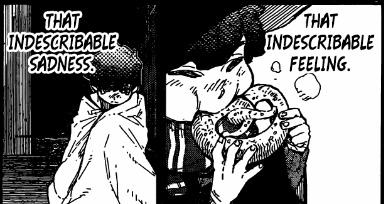
At this point I feel that I dislike backstory not because it was necessary bad or stupid, but because I hate the thought of Ness turning out being so… Flat. So ridiculously touchy, so stubborn for no reason like a ram since a very childhood, so lacking critical thinking skills. So limited, so self-centered (which is visible even in that Kaiser choking himself scene).
Such a completely uninteresting character, predictable and causing only indifference towards himself.
#asks#alexis ness#fuck backstory#michael kaiser#kainess#blue lock analysis#blue lock#I feel lika a failure for seriously analyzing that
47 notes
·
View notes
Text
Can we talk about Aoki sitting
there's a lot of scenes showing Aoki talking to someone else while sitting. Given how important the action of standing up is for Masato's character, it is fair to assume Aoki's stance during a conversation might be interesting to think about to better understand his character.


There's a few similarities in the different scenes in which he is sitting and talking to someone who is standing up :
It is ALWAYS a private conversation, nobody else than Aoki and his interlocutor is present to witness the scene.
Aoki's interlocutor is ALWAYS someone he knew as Masato Arakawa (namely : Ichiban, Sawashiro and Horinouchi).
If Aoki gets up at some point during the conversation, it is ALWAYS when he is raising his voice and trying to intimidate his interlocutor (proving that the action of standing up does hold meaning to Aoki : it is a way to impose himself in a conversation, which makes sense given how he associated his former condition as a disabled person unable to stand up with weakness).
This could be brushed off as a coincidence, given how his office in which most of his scenes are happening is arranged, but we can also observe those same conditions in other scenes happening outside of his office or with characters who didn't know Masato Arakawa.



In his exchange with Ishioda, Tendo or with the Prime Minister, they either are both sitting or both standing up (in the case of Ishioda specifically, it is worth mentioning that their conversation happens right after the one with Horinouchi, giving just enough time for Aoki to get up from his chair in order to talk to Ishioda).

The first thing Aoki does when meeting Ichiban one-on-one is to sit down, before any of them had the time to say anything and before even making eye contact with him.
Another detail about Aoki's character linking back to him sitting down often, is the detail on his design showing his suit partially unbuttonned at all times, in a way that is usually only done when someone is about to sit down because the suit would be uncomfortable buttonned up all the way.
There's a lot of ways one could interpret this recurrent dynamic Aoki has with people he used to know as Masato, especially given the great importance of the "looking down on/looking up to" dynamic Aoki's character plays with throughout the entire game (about which I already partially talked about here). I am planning to talk about it in more details in a more complete post in the near future.
But given how Aoki mentions several times a feeling of nostalgia concerning the relationships he had as Masato Arakawa, it is possible that his tendency to recreate the way he used to interact with the people he knew as his former self is influenced by this same feeling of nostalgia, potentially subconsciously.
That, or it could be a case of thematic irony, showing that no matter how much Aoki would change his body in order to become his idea of the perfect man, he cannot change the connections he has with people and how he fundamentally engages with them. It is a remnant of his perceived former "weakness" compared to other people that he cannot simply erase, because he remembers it, and the people in his life who knew him as this "weaker" self remember as well.
Or both, it could be both.
#not really a fully-fleshed analysis but more of an invitation to discuss : i haven't made up my mind yet as to how i should interpret this#y7 spoilers#ryo aoki#aoki ryo#i like to think that - more pragmatically - the reason why aoki is still mostly seen sitting down#is because he still suffers from chronic pain due to the multiple organ failures he went through as a baby#i think it would be interesting to view him as someone who is masking his disability rather than someone who just stopped being disabled#it would fit with the idea that the way he presents himself as aoki is “just for show” and not at all genuine or sincere#and with the fact that behind the artificiality of who aoki is#waka is still suffering silently#plus i have troubles believing a lung transplant was all it took to COMPLETELY get rid of a condition caused by MULTIPLE organ failures
13 notes
·
View notes
Text
Failure Analysis
The benefits of failure analysis include Identifying molecular fingerprints of unknown compounds, Identifying weight loss at a different temperature, Strict Quality Practices
Measuring the melting point and crystallinity of a sample.
We give Morphology Analysis by using Scanning Electron Microscope (SEM). We use a high-resolution SEM with a large depth of field, which allows our scientists to record closely-spaced specimens at high magnification and sharp focus. At Bhawins you will get quality services for failure analysis. We have a look at our website https://bhawins.com/failure-analysis/
0 notes
Text
Reasons I have a hard time taking canon Vlad 100% seriously:
His nemesis is a freaking 14 year old this is self-explanatory
Keeps getting beaten/outsmarted by a gaggle of teens
Blew up his own house because he couldn't be bothered to do general maintenance on a piece of very valuable and potentially explosive lab equipment
Got bodied by Jack that one time and decided to never fight him again, Jack is canonically 1-0 in a direct 1v1 fight against Plasmius and that is too funny
Gets bodied by his own idiot schemes
Somehow couldn't figure out how to hire a hitman to take out the guy he's hated for years and sends the one thing Jack is supposed to be good at fighting to do the job instead. Are you trying to fail, Vlad?
Got eaten by a monster that one time. Embarrassing.
Did not do his homework when it came to how strong a ghost was at least twice and endangered the entire world and Ghost Zone because of this
In the bad timeline he caused the apocalypse because he is that bad at parenting and somehow didn't think to just send the kid to therapy and grief counseling instead of jumping straight to the mad scientist shit
There's probably more but these are the ones I can think of at the moment. Like he's absolutely done horrible things, no question about it, but then I remember the above and I'm just. All I can do is laugh.
#Danny Phantom#Vlad Masters#Vlad Plasmius#Character Analysis?? I guess??? idk#Maybe it's more of a shitpost#Do not ever ask me to take canon Vlad seriously#I can't#Just. LOOK AT HIM!#He's an idiot and a disaster and his failure rate is ridiculous#Every time he acts threatening it's just undermined by how much of a moron he is#He just sucks!#Danny and co. are only alive BECAUSE of this#I love him for it#It's hilarious#He's one of my favorite characters in the show#But I ain't gonna take him seriously#Vlad shares the title of “Dumbest Smart Guy You Will Ever Meet” with Jack imo#I say all this with the utmost affection for the character cause again he's one of my favs#I feel like a lot of fanon just flat-out ignores how dumb he is in the show so it can make him more scary#Which there's nothing wrong with that you do you boo it's fandom have fun!#But it's just not Vlad to me without the idiot streak
91 notes
·
View notes